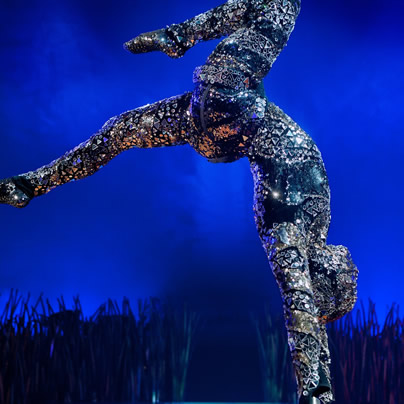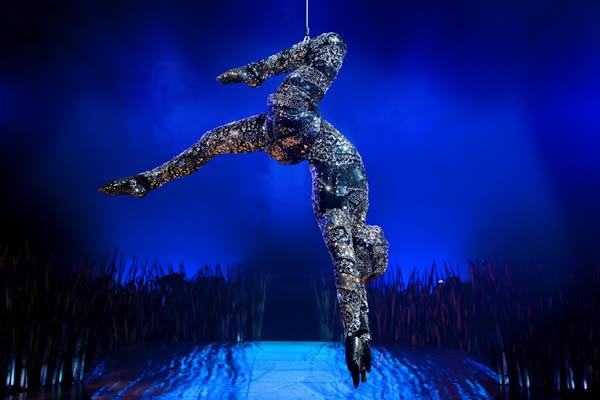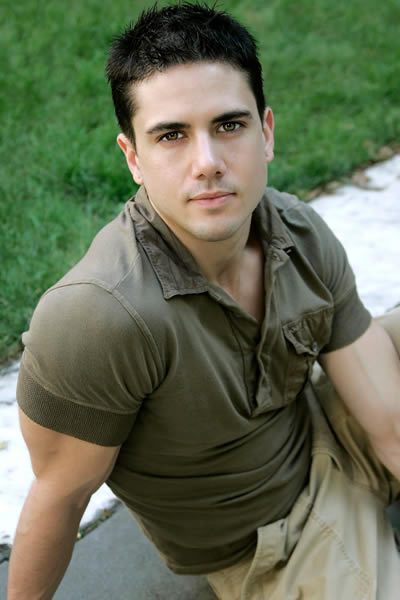Arts & Entertainment
Return to form
Gay Cirque performer in peak shape after conquering addictions


Joe Putignano says his passion for gymnastics never went away. Even in the throes of heroin addiction, he replayed his old routines in his mind. (Photo courtesy Cirque du Soleil)
Cirque du Soleil’s ‘Totem’
Aug. 15-Sept. 30
Plateau at National Harbor
201 Harbor View Ave.
Tickets: $40-$153
cirquedusoleil.com
Cirque du Soleil gymnast Joe Putignano prepares for his character in the big top show “Totem” by donning a dazzling costume containing eight pounds of Swarovski crystals. When he enters the arena, he descends from the ceiling illuminated in light.
“Totem,” which opens at the National Harbor on Wednesday, is a story about evolution, combining the scientific theories and myth that humans have developed about it. Putignano’s character, the Crystal Man, is the spark of hope and light that begins the journey. He says the character embodies Charles Darwin’s quote, “Light will be thrown on the origin of man.”
As he performs, audience members can sense the intensity and passion in the movement of his body. Company manager Jeff Lund describes him as a “human disco ball.” Putignano says, “It is difficult, performing in a heavy costume is like running a small machine and it does take a lot of practice.”
However, the audience will not realize that less than 10 years ago, the spark in Putignano’s life almost went out. At age 17, he began using various drugs, including ecstasy, cocaine and later heroin, and would not be clean again until he was around 29. When he was 19, he quit gymnastics thinking he would never return to the floor.
“I felt I betrayed myself,” he says. “I never wanted to do a handstand or a split again. It was like a divorce.”
Lund, who has worked with Putignano for almost two years and is in charge of almost all aspects of “Totem,” says Putignano’s performances these days defy his background.
“He is a world-class athlete,” he says. “His story is a very inspiring one.”
Putignano began gymnastics when he was around 8 years old, after watching the Olympic gymnasts compete on television. He says as he watched them, he knew he wanted to be doing this for the rest of his life.
He was immediately very good and began competing around the U.S. and went to the Olympic Training Center in Colorado Springs twice when he was 11 and 13.
“As a child you bend to the laws of passion,” Putignano says. “You can’t imagine as many people as passionate as you. Later you see that it is a sport and there are rules, and now everybody sees your imperfections.”
As a Boston native, he says competing in New England is different from competing with top gymnasts from around the country. For a young Putignano, the mounting pressure to reach perfection and to compete began to wear on him. Especially, as he describes, an injury can completely derail a gymnast from his path very quickly.
“We know that our art form is fleeting, we can’t take it for granted because it can leave you in a moment,” he says.
He says growing up with gymnastics made it feel like his church. Though he did not come out until he was 19, being gay and a gymnast was never an issue for Putignano. He says, “The floor has no sexuality.” But the increased competition felt like a violation of his sacred space.
Putignano began taking ecstasy and cocaine during the “’90s rave era” and eventually quit gymnastics when he was a sophomore in college.
“To be a gymnast, one has to conquer perfect precision and control over the physical capacities of the body,” he says. “To be an addict, one must surrender this control over to the underworld, and I couldn’t keep them both together.”
After walking away from competing, Putignano plunged into what would turn out to be a very dark 10 years. He moved to New York in 1999 and began using heroin. He says his experiences with the drug were full of “bitter irony.”
“The more I shot up to escape the memories of my once beautiful pure sport, the quicker I nodded out into a dreamscape of performing my old gymnastics routines,” he says. “I was shooting up to escape the memory of my failed destiny, only to be flooded into an unconscious heroin state where I performed my gymnastics skills over and over. If there was ever a layer of Dante’s inferno, this was it.”
In New York City, he worked various jobs like waiting tables and modeling. He tried to stop several times with no success.
“Eventually, I was getting older and hadn’t gotten any better and over the years I saw the tiny spark of light inside me dimming down to nothing,” he says. “That one thing which made me myself was going to burn out forever. The fear of losing this light kept me constantly chasing sobriety.”
As time went on, Putignano ended up homeless and overdosed twice where he was declared dead both times.
“At the time of my overdoses, I was so far from reality that I was actually strengthened by my experience because I believed I had beat death,” he says.
This cycle continued until he was 26, when he was in rehab for the fifth time. One day, he went up into his room and began doing headstands. Though it would be another three years before he was completely clean and intense training was required to get back in shape, his interest was rekindled. But sobriety did not come easily.
“When I started to audition for shows, I was still not completely clean,” Putignano says. “I would be three months clean and relapse.”
Putignano’s second chance in gymnastics came when he got clean and began performing at the Metropolitan Opera House and Broadway Bares. A pivotal turning point came for him when he was eventually hired by Twyla Tharp to perform in her Broadway show “The Times They Are A Changin,’” based on Bob Dylan’s music. This was important to Putignano, as he was rejected from the show twice before being hired.
“It was such an important point in my sobriety. Tharp is an icon in the dance world,” he says.
While performing on Broadway and the Opera house, he connected with Robert Lepage, one of the creators of Cirque du Soleil. Lepage knew Putignano’s background and asked him if he would like to be part of show. Putignano says it is not a coincidence that his character should represent hope and light in the world.
“For myself, my character represents my sobriety, my hope, my faith and the relentless power of the human spirit,” he says.
Now six days a week, he brings that light to others through the 4,000 pieces of reflective glass. And just like Putignano, Lund says the costume is far more durable than it seems.
“At the end of the night, it gets thrown in the wash with everything else,” he says. “Sometimes pieces will fall off, but we have people who will reattach them when it happens.”
With a tight performing schedule and around six years of sobriety under his belt, Putignano says remaining sober is still a challenge.
“I would love to say that touring has been easy for me in sobriety, but the truth is, it isn’t,” he says. “Some humans are like trees and they need to stay close to their roots. My sober network is in New York City and it has been difficult without them.”
Despite the challenge, he has remained clean so far and he is able to use his experiences to be an emotional support for other performers. He says since he has been in dark places himself, he can be empathetic to others’ emotional struggles.
Lund describes the “Totem” performers and crew as one big family. Nationality and sexuality do not matter there, he says.
“For me as a manager, I try to avoid making lines between artists and technicians and so on, “ he says. “I know in other companies it may be like that, but I like my entire crew to be connected with each other. This is made easy since we are on the road together for so much out of the year.”
What keeps Putignano going is the thought that many who have been in his position have not received a second chance.
“I have to continue to carry the torch for the dead, for those who didn’t get a second chance and I have to do everything in my power to bring hope to the hopeless,” he says. “I was once the hopeless.”
Another Cirque show to open in Baltimore
“Dralion,” Cirque du Soleil’s acrobatic show that fuses influences from the East and the West, is opening in Baltimore on Aug. 22 and runs through Aug. 26.
The name of the show represents the different parts of the world combined— it’s the combination of the dragon, representing the East, and the lion, representing the west. It mainly draws on the 3,000-year-old tradition of Chinese acrobatics combined with the more modern Cirque du Soleil twist, according to the website.
In the show, the four elements of nature come to life. At first they are separated and have their distinct colors. Air is blue, water is green, fire is red and earth is ochre. When they are combined balance is achieved.
“Dralion” is one of Cirque du Soleil’s arena shows, and is performing at the 1st Mariner Arena (201 West Baltimore St.) Tickets range from $40 to $165. For more information, visit cirquedusoleil.com.

‘A Wrinkle in Time’
Through July 20
Arena Stage
1101 Sixth St., S.W.
Tickets range from $59-$209
Arenastage.org
Currently at Arena Stage, talented out actor and singer Taylor Iman Jones is rekindling an old friendship with an adored character of fiction.
Broadway vet Jones is starring as 13-year-old Meg Murry in “A Wrinkle in Time,” the world-premiere musical adaptation of Madeleine L’Engle’s same-titled book.
For many readers, especially women, the classic 1962 young adult novel, was their first foray into sci-fi, particularly one with a female protagonist.
The story centers on Meg, an awkward schoolgirl whose physicist father has mysteriously disappeared. Now, Meg, her popular friend Calvin, and smart younger brother Charles Wallace are tasked with moving through time and space to find him. Along the way they encounter adventure and evil.
For Jones, 33, playing 13-year-old Meg feels freeing in ways. She says, “As you get older, you’re told to grow up, so I like letting go of some of that. To feel feelings in their rawest form and to tap back into that is fun. I like the spontaneity. There are highs and lows to revisit.”
Born and raised in the San Francisco Bay Area, Jones began piano lessons at just six and soon added band and plays to their pursuits. Following high school, she made a deep dive into California theater for seven years before making the big move to New York in 2017 where after just two months she was singing on Broadway.
The determined and appealing Jones, who lives in New York with their partner, boasts an impressive bio. She has appeared on Broadway as Catherine Parr, Henry VIII’s sixth and final wife in Six, and in the original casts of “Head Over Heels” and “Groundhog Day.” She’s been seen in national tours of “Hamilton” and “American Idiot.”
WASHINGTON BLADE: It seems “A Wrinkle in Time” and Meg mean a lot to a lot of people.
TAYLOR IMAN JONES: The book tells the story of a girl with so much undiscovered power who’s accomplishing things she never imagined that she could.
BLADE: Can you relate?
JONES: Meg wears her emotions on her sleeve. I can certainly relate to that. I’m a Pisces. Sometimes being hyperemotional and very empathetic can feel like a burden, but as I’ve matured, I have realized that it’s not a bad quality. And it’s something I’ve learned to harness and to enjoy. I love that I can play a role like Meg in front of thousands of people.
BLADE: Was “Wrinkle in Time” a book you knew well?
JONES: Oh yeah, it’s a favorite book that lives in my heart and my mind. It’s one of the first books that taught me about the adventure of reading.
BLADE: And playing a favorite character must be a kick.
JONES: It really is.
BLADE: Meg is a big part in a big show.
JONES: This musical is huge. They’re traveling through space and meeting people on different planets. 20-person cast. 30 songs in the show. Quite the undertaking and I’m proud of us. I’m on stage for the entire musical and I sing four or five numbers.
As a mezzo soprano I guess you’d say I have the luxury of being able to do a lot of musicals that span a lot of different genres: rock musical, pop musical, and standards. “A Wrinkle in Time” is contemporary musical theater.
For me, singing is probably the least difficult part of the show. What’s harder for me is the way Meg experiences trauma; I need to be careful when I’m screaming and yelling.
BLADE: It seems mostly women have been involved in making this production happen (book by Lauren Yee; music and lyrics by Heather Christian; directed by Lee Sunday Evans; and choreography by Ani Taj.)
JONES: It’s true, the director, writer, etc., and most of our producers are all women. This doesn’t happen most of the time. For me it means new ideas and fresh energy, and pushing the limits of musical theater.
It’s also created a wonderful space in which to work. It can be more generous, and understanding. And centering the story on a young girl is something we can all relate to.
BLADE: Will “A Wrinkle in Time” resonate with queer theatergoers and their families?
JONES: I think so, especially on the heels of pride month. It’s truly a show for all ages about finding your inner strength and fighting for the things that you love; not letting evil win over the power of good, and not just for yourself but for those around you too.
Movies
Two new documentaries highlight trans history
‘I’m Your Venus’ on Netflix, ‘Enigma’ on HBO/Max

One of the most telling things about queer history is that so much of it has to be gleaned by reading between the lines.
There are the obvious tentpoles: the activism, the politics, the names and accomplishments of key cultural heroes. Without the stories of lived experience behind them, however, these things are mere information; to connect with these facts on a personal level requires relatable everyday detail — and for most of our past, such things could only be discussed in secret.
In recent decades, thanks to increased societal acceptance, there’s been a new sense of academic “legitimacy” bestowed upon the scholarship of queer history, and much has been illuminated that was once kept in the dark. The once-repressed expressions of our queer ancestors now allow us to see our reflections staring back at us through the centuries, and connect us to them in a way that feels personal.
One of the most effective formats for building that connection, naturally enough, is documentary filmmaking — an assertion illustrated by two new docs, each focused on figures whose lives are intertwined with the evolution of modern trans culture.
“I’m Your Venus,” now streaming on Netfllix, bookends an iconic documentary from the past: “Paris is Burning (1990), Jennie Livingston’s seminal portrait of New York City’s ballroom scene of the ‘80s. In that film, a young trans woman named Venus Xtravagana delivered first-person confessionals for the camera that instantly won the hearts of audiences — only for them to break with the shattering revelation that she had been murdered before the film’s completion.
That 1988 murder was never solved, but Venus — whose surname was Pellagatti before she joined the House of Xtravaganza – was never forgotten; four decades later, her family (or rather, families) want some answers, and filmmaker Kimberly Reed follows her biological siblings — Joe, Louie, and John, Jr. — as they connect with her ballroom clan in an effort to bring closure to her loss; with the help of trans advocates, they succeed in getting her murder case re-opened, and work to achieve a posthumous legal name change to honor her memory and solidify her legacy.
It’s a remarkably kind and unapologetically sentimental chronicle of events, especially considering the brutal circumstances of Venus’ killing — a brutal death by strangling, almost certainly perpetrated by a transphobic “john” who left her body hidden under a mattress in a seedy hotel — and her decision to leave her birth family for a chosen one. As to the latter, there are no hard feelings among her blood relatives, who assert — mostly convincingly — that they always accepted her for who she was; one senses that a lot of inner growth has contributed to the Pallagatti clan’s mission, which admittedly sometimes resembles an attempt at making amends. For the murder itself, it’s best to leave that part of the story unspoiled — though it’s fair to say that any answers which may or may not have been found are overshadowed by the spirit of love, dignity, and determination that underscore the search for them, however performative some of it might occasionally feel. Ultimately, Venus is still the star of the show, her authentic and unvarnished truth remaining eloquent despite the passage of more than 40 years.
Perhaps more layered and certainly more provocative, documentarian Zackary Drucker’s “Enigma” (now streaming on HBO/Max) delves further back into trans history, tracing the parallel lives of two women — trans pioneer and activist April Ashley and self-styled European “disco queen” Amanda Lear — whose paths to fame both began in Paris of the 1950s, where they were friends and performers together at Le Carrousel, a notorious-and-popular drag cabaret that attracted the glitterati of Europe.
Ashley (who died at 86 in 2021) was a former merchant seaman from Liverpool whose “underground” success as a drag performer funded a successful gender reassignment surgery and led to a career as a fashion model, as well as her elevation-by-wedding into British high society — though the marriage was annulled after she was publicly outed by a friend, despite her husband’s awareness of her trans identity at the time of their marriage. She went on to become a formidable advocate for trans acceptance, and for environmental organizations like Greenpeace, who would earn an MBE for her efforts, and wrote an autobiography in which she shared candid stories about her experiences and relationships as part of the “exotic” Parisian scene from which she launched her later life.
The other figure profiled by “Enigma” — and possibly the one to which its title most directly refers — is Amanda Lear, who also (“allegedly”) started her rise to fame at Le Carrousel before embarking on a later career that would include fashion modeling, pop stardom, and a long-term friendship with surrealist painter Salvador Dalí. A self-proclaimed “disco queen” whose success in Europe never quite spread to American culture (despite highly public associations with musical icons like David Bowie and Roxy Music), Lear’s trajectory has taken her in a different direction than Ashley’s. In the film’s extensive live interview segments, she repeatedly denies and discredits suggestions of her trans identity, sticking to a long-maintained script in which any and all details of her origins are obscured and denied as a matter of course.
At times, it’s almost amusing to observe her performative (there’s that word again) denials, which occasionally approach a kind of deliberate “camp” absurdity in their adamance, but there’s also a kind of grudging respect that’s inspired by the sheer doggedness with which she insists on controlling the narrative — however misguided it may seem to those of us on the outside. Debate about her gender-at-birth has continued for decades, even predating Ashley’s book, so the movie’s “revelations” are hardly new, nor even particularly controversial — but her insistence on discrediting them provides sharp contrast with the casual candor of Ashley’s elegantly confident persona, underscoring the different responses to transphobia that would direct the separate lives of both these former (alleged) friends.
For what it’s worth, Lear sent an email to the Washington Post, calling the movie “a pathetic piece of trash” and denying not just her trans identity but any friendship or association with Ashley, despite ample photographic and anecdotal evidence to the contrary — and while it might come across as callous or desperate for her to maintain the presumed façade, it’s a powerful testament to the power of cultural bullying to suppress the truth of queer existence; the contrast between the life each of these women chose to live speaks volumes, and makes “Enigma” into one of the most interesting — and truthful — trans documentaries to emerge thus far.
While neither film presents a comprehensive or definitive view of trans experience (is such a thing even possible, really?), both offer a perspective on the past which both honors the truth of queer existence and illustrates the ways in which the stigma imposed by mainstream prejudice can shape our responses to the identity through which we are perceived by the public.
That makes them both worth your attention, especially when our queer history — and the acknowledgement of trans existence itself — is at risk or being rolled right back up into the closet.
Sports
Trans cyclist’s victory sparks outrage in conservative media
Katheryn Phillips is originally from DC

On the heels of UPenn erasing the record of the first openly transgender NCAA Division I All-American swimmer and the U.S. Supreme Court’s decision to tackle bans on trans student-athletes, right wing media is now all hot and bothered about the latest trans woman who won a cycling championship — even though she competed according to the rules.
On Tuesday, 58-year-old Katheryn Phillips finished first in USA Cycling’s Lyons Masters National Championship race for women aged 55-59, with a time of 1:42:10, according to the official results posted by the organization. The record shows her gender as “F” for female.
One second behind Phillips was Julie Peterson, with a time of 1:42:11 — as were three other cyclists: Mary Beth Grier, Andrea Cherniak-Tyson, and Carolyn Maddox.
Peterson, 57, was so outraged, she told Fox News she refused to stand on the podium in second place next to Phillips. Her story was swiftly shared by the New York Post (also owned by Fox’s parent company News Corp.), the Daily Mail, Breitbart, and other conservative media.
Both Peterson and another competitor are accusing USA Cycling of “hiding” that a transgender woman had registered to race.
“It was hidden from us. Katheryn Phillips, KJ’s name, was not on that list. And I checked it up all the way to the point of closure when we couldn’t register online anymore,” Debbie Milne told Fox.
“If I had known, I wouldn’t have spent thousands of dollars in travel and time off work to come and do a race,” Peterson said. Fox welcomed Milne, 56, who finished seventh on Tuesday, to Fox & Friends Thursday morning.
(Video courtesy of Fox News)
Peterson told Fox she did complain to USA Cycling officials prior to the race. Both Milne and Peterson referred to Phillips as a male, and with “he/him” pronouns.
“To be fair to all humans, if we want to say ‘him’ or ‘her,’ he was born a biological male, that is a fact,” Milne said. “And that is the thing that makes it an unfair advantage. Whatever has happened after that is a whole different topic.”
“I said, ‘I don’t want to race against a man,’ and they quickly scolded me and said ‘Oh, you can’t call him a man,’ and I’m like ‘Well, he is a man,’ so I was quickly scolded and corrected that it is a woman and I don’t even know what to say.”
USA Cycling did not respond to the Washington Blade’s emails requesting comment.
Phillips, who goes by Kate and by “KJ,” is a former rugby player with the D.C. Furies, who stated in the comments of a 2024 article published by Zwift Insider that she was the first out trans athlete in the U.S. to compete under the 2004 International Olympic Committee’s guidelines on trans participation.
“When USA Rugby told me about the IOC decision in 2004, I raised my hand to be included. I experience nothing but joy when I play, ride, and race,” Phillips said.
As the Blade has reported, the International Olympic Committee drastically revised those rules in 2021, and in March, Republican lawmakers in D.C. demanded the IOC ban trans female athletes from women’s sporting events altogether.
The Blade also reached out to Phillips for comment but as of press time we have not received a response. She told Zwift Insider in March 2024 she does not let those who disapprove or spread hate impact her performance or her attitude.
“I am unaffected by dissent. I love, I share joy, I am me, and I have been my authentic self for decades,” she said. It’s been reported Phillips came out in 1999, and told Zwift Insider she considers herself a lifelong cyclist.
“I’ve been on a bike for as long as I can remember,” said Phillips. “As kids, my friends and I rode all over town, we were feral kids; no cell phones, no trackers … we just roamed, and nobody got in trouble or hurt bad enough not to ride home … Scrapes/bruises/cuts were not an issue for us. In my teens, I worked for myself as a court/legal messenger, doing all of the work via my bike until I got a car. Raced BMX as a kiddo (when I mowed lawns to cover the race entry fees), I did MTB stuff (non-racing) and Sprint/Olympic Triathlons in my 30’s, and now I’m racing on Zwift, Road/Gravel, and CX in my 50s.”
In the comments section, Phillips made clear she’s not competing to win.
“I don’t do sports for victory, I do it because like many other women, I am an athlete to my core,” she said. “Unlike some, I am not there to WIN, I am there to do my best with the competitors and teammates I have around me trying to do the same…we are in it for the experience. I rejoice in their wins, and a lot of joy is reflected back to me when I have a good day.”
-

 U.S. Supreme Court2 days ago
U.S. Supreme Court2 days agoSupreme Court to consider bans on trans athletes in school sports
-

 Out & About2 days ago
Out & About2 days agoCelebrate the Fourth of July the gay way!
-

 Virginia2 days ago
Virginia2 days agoVa. court allows conversion therapy despite law banning it
-

 Maryland5 days ago
Maryland5 days agoLGBTQ suicide prevention hotline option is going away. Here’s where else to go in Md.











